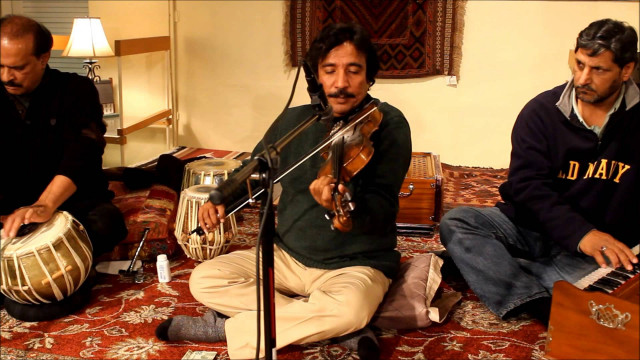Struggles of an artist: Violinist plays tunes of uncertain future
Award winner Raees Khan discourages his children from his profession due to societal taboos

Violinist Ustad Raees Khan performing in New York
PHOTO: YOUTUBE
Violinist Ustad Raees Khan, who spent his entire life entertaining people with his hypnotising notes on the violin — which earned him the Pride of Performance award and the Sitara-i-Imtiaz, does not wish that his children carry forward his legacy.
His reason?
Societal taboos and the difficulties he faced in getting recognition, acceptability and most importantly, earn a respectable living.
Raees, who is part of an Artists Welfare Committee — formed under the leadership of former Advisor to Prime Minister Irfan Siddiqui, he said it was a rare government gesture.
"It was for the first time that any government acknowledged the importance of musicians and included their welfare in their agenda by forming an artist's welfare committee,” Raees noted.
However, he expressed uncertainty over the committee’s future when a new government takes over the helm later this month.
“I do not know what will be the fate of that committee now when a new government is to take power."
Jumping instruments
In a way, Raees’ advice to his children to not follow in his footsteps follows from what he had done.
Raees’s father, Ustad Fateh Ali Khan, was a renowned Sitar player.
Narrating the tale of how a then young Raees decided to break from tradition, the violinist recalled that he was just nine-years-old then, studying in a government school.
One day, while sitting with his father late at night, the Sitar maestro expectantly asked what Raees wanted to be when he grew up.
Fateh may have probably hoped that his son would remark from a list of the usual professions youngsters are nurtured to care about from an early age: that of becoming a doctor or an engineer or even to carry on his legacy of playing the Sitar.
Raees, though, surprised his father by responding that he would rather pick up the violin.
"It is the sound of the violin which always attracted me,” Raees notes.
"It was 12am at that time and I wanted to sleep after this discussion,” the violinist chuckled, adding that what came next even surprised him.
“My father ordered me to bring an old violin we had in our home which had only two wires available. I immediately started practising the basic notes (Sargam) of music. And from that point onwards, my musical journey began,” he recalled.
"Having a musical background, I grew up with every musical instrument placed in our drawing room and listening to music and practising alongside my father’s students day and night so it was natural to develop an urge for learning a musical instrument," Raees explained his attraction to music.
"My brother and I used to wake up at 4am every day to practice music regardless of the severity of the weather,” he said, noting that while his brother strummed the sitar, he fiddled with the violin.
“Sitar is played in a sitting position but with a violin, I have to remain standing for several hours. We started practising music for six to seven hours daily," Raees said.
Tough times and a break
“Unfortunately my father could give us only seven to eight more years of guidance and then he passed away. It was the toughest time of my life especially at a very young age,” Raees said.
But there were tougher times ahead and one which taught him that his children should not follow him.
“I, along with my elder brother, took on the responsibility of earning and run household affairs. I started playing tunes on the violin at a very young age at weddings and even ordinary functions on the streets and in different neighbourhoods of Rawalpindi for meagre sums of Rs100 or Rs200,” he recalled.
Raees finally caught a break when he got picked up to perform for a children’s programme at the Pakistan Television — the state broadcaster.
“It was a breakthrough for my career."
Raees went to the Netherlands to play alongside legendary ghazal singer Ghulam Ali before going on a tour of Europe, the Middle East and the United States.
Raees said he played both, eastern and western music on his violin at all the biggest art platforms and prestigious institutions inside the country and abroad.
However, Raees Ahmad tried to keep away his three children away from music due to the difficulties he faced as a musician throughout his life.
He said that despite having talent and creativity he was always searching for respect for his art, encouragement, acceptability and financial stability.
But it seems, one of his children took his advice to heart.
After completing his education and starting a professional career, Raees said that one day one of his sons told him with a gloomy face that "I am doing this job in a high profile multi-national company wearing a suit and a tie for your sake, but all these things have no attraction for me at all.”
Published in The Express Tribune, July 16th, 2018.



















COMMENTS
Comments are moderated and generally will be posted if they are on-topic and not abusive.
For more information, please see our Comments FAQ